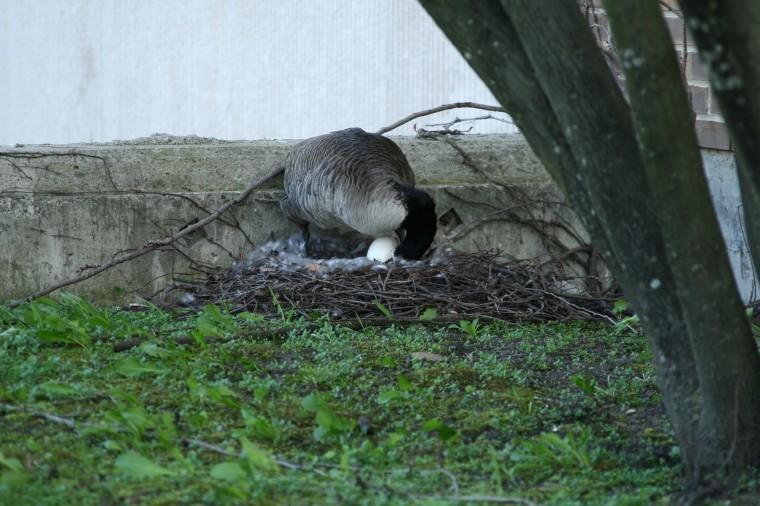‘A nuisance brought on ourselves’: Geese at NIU
April 2, 2012
As senior English major Chris Rowe walked across the bridge near Cole Hall, he heard a faint squawking noise behind him that suddenly grew louder.
Rowe turned around and was startled to see a goose flapping its wings at him. The two looked at each other for a brief moment. Suddenly, the goose started chasing the student.
Rowe said the goose chased him all the way to the UPS mailbox near Neptune Hall East. Once there, the goose finally retreated.
“When I told my friends what happened they were like, ‘Yeah right,’” Rowe said.
From March to April, the Canada geese inhabiting NIU’s campus are nesting and can be territorial. The geese may be seen by some as a nuisance or a threat because of their squawking and flapping. At the same time, others are intrigued by the geese’s behavior.
Darryl Grayson, interim superintendent of the Grounds Department, said the majority of the geese nest near the lagoons.
One goose in particular keeps returning to her nesting spot in a flowerbed at the entrance to Founder’s Memorial Library. Fencing was installed, but that didn’t deter her from nesting there again, Grayson said.
Bob Fisher, president of the Illinois Ornithological Society, said college campuses are ideal habitats for geese because they have no predators. Geese are adaptive, and when they find a good spot to nest they will return there year after year, he said.
Library assistant Kate Hartman said the goose nesting near the library used to flap its wings and honk at students. There haven’t been any problems even since a barricade was put near the flowerbed, she said.
“Geese are protective of their nests and can be pretty aggressive,” Fisher said. “If you try and drive them off the nest, eventually he or she will leave and then try and nip at you. They can give you a good pinch. If they don’t like you, move away.”
Fisher said retention ponds and lawns give geese an ideal habitat away from predators where they can proliferate. About 50,000 non-migratory geese live in and around Chicago, he said.
“In one sense they are a nuisance, but they are a nuisance we brought on ourselves,” Fisher said.







